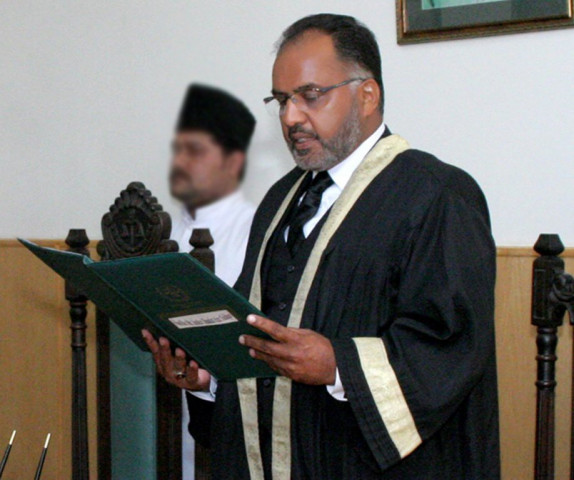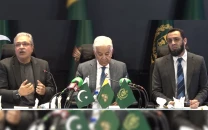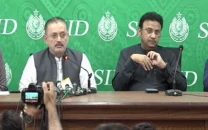Declaring faith compulsory to join army, judiciary, civil services: IHC
Rules appointment of a non-Muslim on constitutional posts against the organic law

Islamabad High Court (IHC) Justice Shaukat Aziz Siddiqui. PHOTO: MUHAMMAD JAVAID / EXPRESS
The court also stated that an affidavit is required in order to get Computerised National Identity Cards, passport, birth certificate, entry in voters list.
IHC’s Justice Shaukat Aziz Siddiqui has directed the parliament to make necessary legislation and also introduce requisite amendments in the existing laws to ensure that all the terms specifically used for ‘Islam’ and ‘Muslims’ are not used by the persons belonging to any of the minorities for hiding their real identity or for any other purpose.
“The matter of absolute and unqualified finality of prophethood of Muhammad (Peace be upon him) the last of the prophets is the nucleus of our religion,” Justice Siddiqui stated in his short order in the case pertaining to the controversy regarding the Khatm-e-Nabuwat clause in the Election Act, 2017.
IHC partially suspends applicability of Election Act 2017
In addition, Justice Siddiqui has ordered the National Database Registration Authority (NADRA) to fix time duration for any citizen who intends to make correction or change in the already given particulars, especially religion.
The court order declares it mandatory for all the institutions to engage Muslim teachers for teaching Islamiat/Denyat as subject. The Deputy Attorney General (DAG) Arshad Mehmood Kayani told the reporters that the last judgment on the issue of Khatm-e-Nabuwat came in 1993 by the Supreme Court.
The court has appreciated Kayani’s role stating he helped a lot in reaching the right conclusions by successfully completing all the responsibilities assigned to him.
Also, Justice Siddiqui has directed the government to take special measures ensuring availability of correct particulars of all the citizens so that it should not be possible for any citizen to hide his/her real identity and recognition.
Further, the judge stated that the government shall also take immediate steps to conduct an inquiry concerning alarming and visible difference in the population record of Ahmadis available with NADRA and figure collected through the recent census.
Data of 1998 census revealed that population of Ahmedis was recorded as 286,212 while data provided by NADRA revealed that just over 167,000 Ahmedis were registered in Pakistan and 10,205 have changed their religious status from Muslim to Ahmedis.
Electoral reforms law challenged in top court
“It is binding on the state to take care of the rights, feelings and religious beliefs of the Muslim Ummah and to also ensure the protection of rights of minorities in the light of teachings of Islam being the religion declared by the Constitution of the country,” Justice Siddiqui stated.
In the order, the court noted that soon after the emergence of legal default in the Election Act 2017, the parliament by its collective wisdom and understanding displayed complete sensitivity towards the matter of Khatm-e-Nabuwat and brought it in conformity with the requirements. “These matters demand such sensitivity and unity,” he stated.
Justice Siddiqui commended Senator Raja Zafarul Haq’s report into the Khatm-e-Nabuwat controversy. “Senator Raja Zafarul Haq is well known for his legal acumen as lawyer and experienced legislator … with his honesty and wisdom he handled all the points very comprehensively, which annulled all the negative impressions,” the order read. Now, he said, it’s for the parliament to further deliberate on the issue or not.
“It is mandatory for every Muslim to guard and protect this nucleus,” he stated, adding that other than the protection of the basic belief of Khatm-e-Nabuwat, the parliament being the guardian of religious core should also take measure which can completely terminate those who scar this belief.
Justice Siddiqui said that appointment of a non-Muslim on constitutional posts is against the organic law and rituals, adding non-Muslims do not qualify to be elected on certain constitutional offices. For most of the institutions including parliament, he explained, there are reserved seats for minorities.
“When any member of the minority group conceals his/her religion and belief through fraudulent means ... is actually an open defiance to the words and spirit of the Constitution,” he stated. “To prevent this disobedience, the state needs to take immediate measures,” he added.
IHC reserves verdict in Khatm-e-Nabuwat clause change case
Justice Siddiqui has observed that minorities residing in Pakistan hold a separate identification in reference to their names and identity but according to the Constitution, one of the minorities do not hold a distinct identification due to their names general attire which leads to crises.
“Due to their names they can easily mask their belief and become part of Muslim majority,” he stated, “[and] they can gain access to dignified and sensitive posts resulting in accumulation of all benefits.”
The judge has ruled that it is mandatory for every citizen to get their identity with authentic particulars and no Muslim is permissible to disguise his/her identity as non-Muslim and no non-Muslim has the right to appear as a Muslim.
“Any citizen who does so, will betray the State resulting in exploiting the Constitution,” Justice Siddiqui has held.
He said that Islam and Constitution provides complete religious freedom and basic rights of the minorities (non-Muslims), adding it is the duty of the state to protect their life, wealth, property, dignity and assets as citizens of Pakistan. “It is the basic duty of every citizen to be faithful to the state and abide by the rules of law and Constitution,” he said.
The judgment has come on the petitions of Mulana Allah Wasaya, Tehreek Labbaik Ya Rasool Allah, Younus Qureshi and Civil Society.
Petitioner Mulana Allah Wasaya through his counsel Hafiz Arfat had stated that the Elections Act, 2017 relating to provisions/declaration/oaths is against Article 8 and 227 of the Constitution and has resulted into serious law and order situation throughout the country.
Among several prayers, he prayed the court to direct federation to immediately take all necessary measures for revival of all provisions which were in existence prior to the promulgation of the Elections Act, 2017) relating to Qadiani group/Lahori group.
Several scholars and lawyers rendered their assistance in the case as amicus curiae in the case and almost all of them informed the court that concealing real faith is a crime, cheating and fraud with the state.


















COMMENTS
Comments are moderated and generally will be posted if they are on-topic and not abusive.
For more information, please see our Comments FAQ